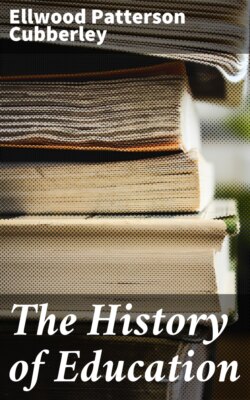Читать книгу The History of Education - Ellwood Patterson Cubberley - Страница 31
На сайте Литреса книга снята с продажи.
III. THE TRANSITION TO SCHOOL EDUCATION
ОглавлениеBEGINNINGS OF SCHOOL EDUCATION. Up to about 300 B.C. education had been entirely in the home, and in the activities of the fields and the State. It was a period of personal valor and stern civic virtue, in a rather primitive type of society, as yet but little in contact with the outside world, and little need of any other type of training had been felt. By the end of the third century B.C., the influence of contact with the Greek cities of southern Italy and Sicily (Magna Graecia), and the influence of the extensive conquests of Alexander the Great in the eastern Mediterranean (334–323 B.C.), had begun to be felt in Italy. By that time Greek had become the language of commerce and diplomacy throughout the Mediterranean, and Greek scholars and tradesmen had begun to frequent Rome. By 303 B.C. it seems certain that a few private teachers had set up primary schools at Rome to supplement the home training, and had begun the introduction of the pedagogue as a fashionable adjunct to attract attention to their schools. These schools, however, were only a fad at first, and were patronized only by a few of the wealthy citizens. Up to about 250 B.C., at least, Roman education remained substantially as it had been in the preceding centuries. Reading, writing, declamation, chanting, and the Laws of the Twelve Tables still constituted the subject-matter of instruction, and the old virtues continued to be emphasized.
By the middle of the third century B.C. Rome had expanded its rule to include nearly all the Italian peninsula (see Figure 16), and was transforming itself politically from a little rural City-State into an Empire, with large world relationships. A knowledge of Greek now came to be demanded both for diplomatic and for business reasons, and the need of a larger culture, to correspond with the increased importance of the State, began to be felt by the wealthier and better-educated classes. Greek scholars, brought in as captured slaves from the Greek colonies of southern Italy, soon began to be extensively employed as teachers and as secretaries.
About 233 B.C., Livius Andronicus, who had been brought to Rome as a slave when Tarentum, one of the Greek cities of southern Italy, was captured, [13] and who later had obtained his freedom, made a translation of the Odyssey into Latin, and became a teacher of Latin and Greek at Rome. This had a wonderful effect in developing schools and a literary atmosphere at Rome. The Odyssey at once became the great school textbook, in time supplanting the Twelve Tables, and literary and school education now rapidly developed. The Latin language became crystallized in form, and other Greek works were soon translated. The beginnings of a native Latin literature were now made. Greek higher schools were opened, many Greek teachers and slaves offered instruction, and the Hellenic scheme of culture, as it had previously developed in Attica, soon became the fashion at Rome.
CHANGES IN NATIONAL IDEALS. The second century B.C. was even more a period of rapid change in all phases and aspects of Roman life. During this century Rome became a world empire, annexing Spain, Carthage, Illyria, and Greece, and during the century that followed she subjugated northern Africa, Egypt, Asia Minor, and Gaul to the Elbe and the Danube (see Figure 18). Rome soon became mistress of the whole Mediterranean world. Her ships plied the seas, her armies and governors ruled the land. The introduction of wealth, luxuries, and slaves from the new provinces, which followed their capture, soon had a very demoralizing influence upon the people. Private and public religion and morality rapidly declined; religion came to be an empty ceremonial; divorce became common; wealth and influence ruled the State; slaves became very cheap and abundant, and were used for almost every type of service. From a land of farmers of small farms, sturdy and self-supporting, who lived simply, reared large families, feared the gods, respected the State, and made an honest living, it became a land of great estates and wealthy men, and the self-respecting peasantry were transformed into soldiers for foreign wars, or joined the rabble in the streets of Rome. [14] Wealth became the great desideratum, and the great avenue to this was through the public service, either as army commanders and governors, or as public men who could sway the multitude and command votes and influence. Manifestly the old type of education was not intended to meet such needs, and now in Rome, as previously in Athens, a complete transformation in the system of training for the young took place. The imaginative and creative Athenians, when confronted by a great change in national ideals, evolved a new type of education adapted to the new needs of the time; the unimaginative and practical Romans merely adopted that which the Athenians had created.
